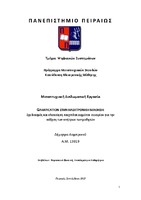| dc.contributor.advisor | Παρασκευά, Φωτεινή | |
| dc.contributor.author | Λαμπρινού, Δήμητρα | |
| dc.date.accessioned | 2016-07-11T09:03:01Z | |
| dc.date.available | 2016-07-11T09:03:01Z | |
| dc.date.issued | 2015-09 | |
| dc.identifier.uri | https://dione.lib.unipi.gr/xmlui/handle/unipi/8934 | |
| dc.description.abstract | Με την παρούσα ερευνητική εργασία επιχειρείται να διερευνηθεί σε ποιο βαθμό η πρακτική της Παιχνιδοποίησης (Gamification) επιδρά θετικά στην ανάπτυξη κινήτρων (motivation) των εκπαιδευόμενων. Στόχος της εργασίας, λοιπόν, είναι η σχεδίαση ενός ηλεκτρονικού περιβάλλοντος με την πρακτική της παιχνιδοποίησης βάσει των συνιστωσών της θεωρίας Self Determination Theory (SDT), προκειμένου να αυξηθούν τα κίνητρα των μαθητών. Δημιουργούνται καλές πρακτικές εισαγωγής μηχανισμών παιχνιδιών (Game mechanics) μέσω του συστήματος διαχείρισης μάθησης (LMS) Moodle. Το περιεχόμενο του εκπαιδευτικού σεναρίου αφορά την «Νεανική επιχειρηματικότητα» και ακολουθεί διδακτικές στρατηγικές του μοντέλου «Μάθησης με τη μέθοδο Project» (Project-based Learning).
Η μελέτη που πραγματοποιήθηκε στην παρούσα εργασία αναζητά αν υπάρχει στατιστικά σημαντική επίδραση της Παιχνιδοποίησης στην εκπαιδευτική διαδικασία στα κίνητρα των μαθητών (motivation), και ειδικότερα στις εξαρτημένες μεταβλητές Αυτονομία, Ικανότητα και Σχετικότητα, βασικές συνιστώσες της θεωρίας κινήτρων SDT.
Στην έρευνα αυτή επιλέχθηκε ένα σχέδιο με βάση ποσοτική στατιστική ανάλυση των δεδομένων που λάβαμε σε συσχετισμό με τις συνιστώσες της παρούσας εργασίας. Το εργαλείο μέτρησης που δόθηκε στο δείγμα ήταν το ίδιο στην αρχή και τέλος του μαθήματος. Έτσι, μετρήθηκαν αρχικά τα κίνητρα των μαθητών σε συνθήκες πριν και μετά τη διδακτική παρέμβαση. Στο τέλος επαληθεύτηκε ότι τα αποτελέσματα ήταν σχετικά υψηλότερα από αυτά της παραδοσιακής μάθησης και υπήρχε βελτίωση στα κίνητρα των μαθητών.
Στη δεύτερη φάση της έρευνας το ηλεκτρονικό μάθημα που ενσωματώνει τους μηχανισμούς παιχνιδιών (game mechanics) στα πλαίσια της παιχνιδοποίησης (gamification), αξιολογήθηκε από τους εκπαιδευόμενους διαδικτυακά μέσω ερευνητικού ερωτηματολογίου στο Moodle τύπου COLLES. Έτσι, μετρήθηκε η αποτελεσματικότητα του περιβάλλοντος αυτού. Οι εκπαιδευόμενοι έμειναν ικανοποιημένοι από το μάθημα στο Moodle.
Η σημαντικότητα αυτής της εργασίας έγκειται στο γεγονός ότι παιχνιδοποιεί τη δομή και το περιεχόμενο του μαθήματος (Structural & Content Gamification), με στόχο την αύξηση των εσωτερικών κινήτρων μέσω της θεωρίας SDT. Δίνει έμφαση στο σχεδιασμό ενός
εκπαιδευτικού περιβάλλοντος παιχνιδοποίησης με την αξιοποίηση των σύγχρονων τεχνολογικών μέσων και θεωρίας “Game design”, μέσω του οποίου ο εκπαιδευτικός και οι δημιουργοί εκπαιδευτικού υλικού μπορεί να ενισχύσει τα επίπεδα αποδοτικότητας των εκπαιδευομένων, επιτυγχάνοντας τους μαθησιακούς στόχους οποιουδήποτε μαθήματος. | el |
| dc.format.extent | 187 | el |
| dc.language.iso | el | el |
| dc.publisher | Πανεπιστήμιο Πειραιώς | el |
| dc.rights | Attribution-NonCommercial-NoDerivatives 4.0 Διεθνές | * |
| dc.rights.uri | http://creativecommons.org/licenses/by-nc-nd/4.0/ | * |
| dc.subject | Παιχνίδια, Εκπαιδευτικά | el |
| dc.subject | Ηλεκτρονική μάθηση | el |
| dc.title | Gamification στην ηλεκτρονική μάθηση : σχεδιασμός και υλοποίηση παιχνιδοποιημένου σεναρίου για την αύξηση των κινήτρων των μαθητών | el |
| dc.type | Master Thesis | el |
| dc.contributor.department | Σχολή Τεχνολογιών Πληροφορικής και Επικοινωνιών. Τμήμα Ψηφιακών Συστημάτων | el |
| dc.description.abstractEN | This master thesis is a product of a research that monitors the efficiency of practical usage of gamification and its influence towards positive motivational development of the students. The goal of this Master Thesis is to design and implement an eClass through practical usage of gamification based on the core components of Self Determination Theory (SDT), so as to improve student engagement in class.
Using the best practices around importing game mechanics, we gamify the structure and content of our Learning Management System (LMS) , Moodle. The content of our educational scenario is about “Youth Entrepreneurship” and follows the core principles of “Project Based Learning” (PBL).
The study that concluded in this thesis seeks if there is an actual statistically important effect of gamification on the students’ level of engagement, more specifically, SDT’s dependent variables Autonomy, Competence and Relatedness.
Our research plan was based on quantitative statistical analysis of our received data in conjunction with the components of this thesis. The tool used to evaluate our scenario was given to our test group before and after the gamified sessions in class. As expected there was a clear and distinctive motivation measurement pre-session and post-session, that verified the increase in motivation and engagement levels, in conjunction with the levels that they had during traditional teaching methods.
At the second phase of our Thesis, our online course that embeds our game mechanics in the context of gamification was evaluated by the students online through Moodle’s research questionnaire (COLLES). As such the effectiveness of Moodle was measured accordingly. The results indicated that the students were satisfied with the usage of Moodle.
The importance of this Thesis lies in the fact that gamifying both the structure and content of any course in particular can indeed increase student effort and engagement through SDT. Our primary focus is the design and implementation of a gamified eLearning environment
through the usage of modern technology and Game Design theory into the educational context. This acting as a tool for any instructional designer, content author or teacher to increase the levels of motivation in class, thus further increasing the overall class performance and achieving all the learning outcomes and goals with a higher success rate. | el |
| dc.contributor.master | Ψηφιακά Συστήματα και Υπηρεσίες | el |
| dc.subject.keyword | Moodle | el |
| dc.subject.keyword | Εκπαιδευτικά σενάρια | el |



